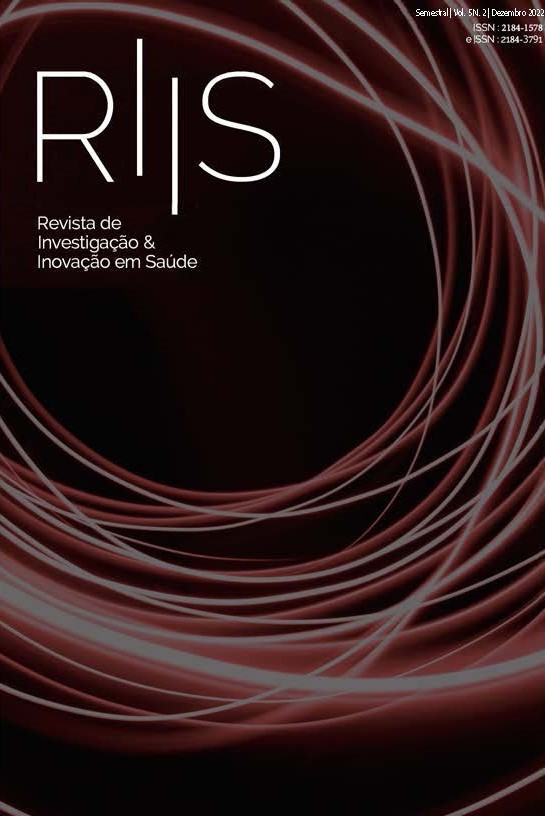Caring for culturally sensitive Muslim families in a developmental transition
DOI:
https://doi.org/10.37914/riis.v5i2.190Abstract
Background: health beliefs and practices are a perpetuated heritage in muslim families. The way they experience birth is an experience influenced by religious and sociocultural aspects. Objective: to analyze how muslim families experience the parental transition process. Methodology: described observational study of a qualitative nature. Research question: How do Muslim families experience the process of transition to parenthood? Sample of six women, from muslim families, aged 20-30 years, residing in Lisbon. The collection of information was obtained through semi-structured interviews and the data were subjected to content analysis. Ethical procedures inherent to the research were considered. Results: three categories emerged from the interviews: Waiting supported by the family; Birth is a female matter; Intergenerationality in transition. Conclusions: in Islamic communities, parental roles and the performance of maternity care are supported by the extended family to facilitate essential learning, whereby the mother or mother-in-law accompanies the pregnancy, taking on the domestic tasks, care, and surveillance of the pregnant woman. In postpartum and newborn care, there are traditional elements that need the attention of health professionals.
References
Andrews, M., Boyle, S., & Collins, W.A. (2020). Transcultural concepts in nursing care. (8th ed.). Wolters Kluwer.
Attum, B., Hafiz, S., Malik, A. & Shamoon, Z. (2022). Cultural competence in the care of Muslim patients and their families. https://www.ncbi.nlm.nih.gov/books/NBK499933/
Barbosa, F.C. & Paiva, C.M. (2017). Sexo/prazer no Islam é devoção. Religião e Sociedade. 37(3): 198-223. http://dx.doi.org/10.1590/0100-85872017v37n3cap08 DOI: https://doi.org/10.1590/0100-85872017v37n3cap08
Bardin, L. (2016). Análise de conteúdo. Edições 70.
Bijos, L. (2020). Para além dos véus - ser mulher no islã. Editora UFPB.
Brathwaite, B. (2020). Diversity & cultural awareness nursing practice. Sage publishing company.
Carter C.A. & McGoldrick. M. (2011). The family life cycle: a framework for family therapy. Gardner Press.
Çelik, H. (2020). Mothers and parent’s marital relations: influential agents in father-child relation. World Journal of Education, 10(1), 164-177. https://doi.org/10.5430/wje.v10n1p164 DOI: https://doi.org/10.5430/wje.v10n1p164
Comunidade Islâmica de Lisboa (2021). O Islão - Breve Resumo. https://www.comunidadeislamica.pt/islao.html
Cunha, A.C.B., Eroles, N.M.S. & Resende, L.M. (2020). Tornar-se mãe: alto nível de estresse na gravidez e maternidade após o nascimento. Interação em psicologia, 24(3), 279-287. http://dx.doi.org/10.5380/riep.v24i3.62768 DOI: https://doi.org/10.5380/riep.v24i3.62768
Duderija, A., & Rane, H. (2019). Islam and Muslins in the west. major issues and debates. Palgrave Macmillan. DOI: https://doi.org/10.1007/978-3-319-92510-3
Eurostat (2022). Migration and migrant population statistics. Statistics Explained. https://ec.europa.eu/eurostat/statistics-explained/SEPDF/cache/1275.pdf
Farooq, M. (2019). Walayah (guardianship): the authority over a woman’s choice in marriage and how this reflects a desire to control and kafa’a (equality): a barrier to a woman’s marriage choice? Granite Journal, 3(2), 20-27.
Figueiredo, M.H. (2012). Modelo dinâmico de avaliação e intervenção familiar. Lusociência.
Franklin, Q., & Mooney-Doyle, K. (2019). Social, cultural, religious, and family influences on child health promotion. In M. J. Hockenberry, D. Wilson, & C. C. Rodgers. Wong’s nursing care of infants and children (11th ed., pp. 15-40). Elsevier.
Giger, J.N. & Haddad, L.G. (2021). Transcultural nursing: assessment and intervention (8th ed.). Elsevier.
Jeremias, C. (2019). Contributo das variáveis sociocultural e espiritual na apreciação de famílias islâmicas. In H., Ferreira et al (Org). 2º Congresso internacional de enfermagem de saúde familiar & 1º Congresso ibérico de saúde familiar - livro de resumos. (pp. 51). Sociedade Portuguesa de Enfermagem de Saúde Familiar.
Küng, H. (2017). Islão – passado, presente e futuro. Edições 70.
Leininger, M.M. (2018). Transcultural nursing: concepts, theories, research, and practices (5th ed.) McGraw-Hill.
Liversage A. (2020). Polygamy, wellbeing, and ill-being amongst ethnic Muslim minorities. In M. Tiilikainen, M. Al-Sharmani, S. Mustasaari, Wellbeing of transnational Muslim families. marriage, law and gender (pp. 78-93). Routledge. DOI: https://doi.org/10.4324/9781315231976-5
Marphatia, A.A., Ambale, G.S. & Reid, A.M. (2017). Women’s under-age marriage in south asia. Frontiers in Public Health. Doi: 10.3389/fpubh.2017.00269 DOI: https://doi.org/10.3389/fpubh.2017.00269
Meleis, A.I. (2018). Theoretical nursing. Development and progress (6th ed.). Wolters Kluwer.
Silva, S.R.O., Castro, C.M. & Monteiro, I.F. (2021). Da Síria ao Brasil: dimensões culturais de mulheres imigrantes nas percepções do cuidado e assistência à gestação, parto e pós-parto. Idéias, (12) 01-28. DOI 10.20396/ideias.v12i00.8658527 DOI: https://doi.org/10.20396/ideias.v12i00.8658527
Tralhão, F., Rosado, A.F., Gil, E., Amendoeira, J., Ferreira, R. & Silva, M. (2020). A família como promotora da transição para a parentalidade. Revista da UIIPS da Unidade de Investigação do Instituto Politécnico de Santarém, 8(1), 17-30 http://ojs.ipsantarem.pt/index.php/REVUIIPS
The Qur’an (s. d.). English Language. The noble qur’an. Translation by Muhammad Taqî-ud-Dîn Al-Hilâlî and Muhammad Muhsin Khân. (pp. 51). King Fahd Complex For The Printing of the Holy Qur’an.
Wrigth, L.M. & Leahey, M. (2019). A guide to family assessment and intervention. (7th ed.). F.A. Davis Company.
Downloads
Published
How to Cite
Issue
Section
License
Copyright (c) 2023 Fátima Rodrigues, Cristina Jeremias

This work is licensed under a Creative Commons Attribution 4.0 International License.















